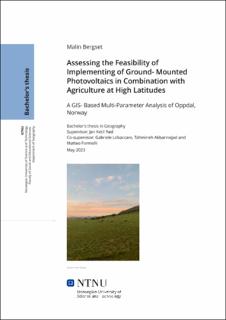| dc.contributor.advisor | Rød, Jan Ketil | |
| dc.contributor.advisor | Lobaccaro, Gabriele | |
| dc.contributor.advisor | Akbarinejad, Tahmineh | |
| dc.contributor.advisor | Formolli, Matteo | |
| dc.contributor.author | Bergset, Malin | |
| dc.date.accessioned | 2023-07-05T17:25:25Z | |
| dc.date.available | 2023-07-05T17:25:25Z | |
| dc.date.issued | 2023 | |
| dc.identifier | no.ntnu:inspera:142256558:51898851 | |
| dc.identifier.uri | https://hdl.handle.net/11250/3076401 | |
| dc.description.abstract | Det er ei anslått auke i energietterspurnaden over heile verda, samstundes som karbonavtrykket må reduserast for å bevare planeten vår og nå klimamåla. Solenergi får mykje merksemd som ei fornybar energikjelde, men det er framleis skepsis til teknologien i nordisk klima på grunn av sesongvariasjonar i solinnstråling og produksjonspotensial. Solenergi har følgeleg ikkje blitt implementert i Noreg i stor skala samanlikna med andre europeiske land. For å dekke fremtidens energibehov er det dog viktig å utnytte alle mogelegheiter.
Denne oppgåva presenterer ei vurdering av gjennomførbarheita av å implementere landbaserte solcellemoduler og kombinere energiproduksjon med landbruksaktivitetar. Kartlegging av solinnstråling for eit studieområde i Oppdal vart gjort med hjelp av geografiske informasjonssystem. Resultata frå denne analysen ble nytta for å estimere produksjonspotensialet for elektrisk kraft for utvalde landbruksområder i studieområdet. Vidare diskuterast potensialet og sentrale utfordringar knytt til implementering av landbaserte solcellemoduler og andre fornybare energikilder ved overgang til eit nytt energilandskap. | |
| dc.description.abstract | There is a projected increase in energy demand all over the world, at the same time as carbon footprint must be reduced in order to preserve our planet and achieve climate goals. Solar energy is gaining attention as a renewable energy source, but there is still scepticism towards the technology in Nordic climates due to seasonal variations in insolation and production potential. Consequently, solar energy has not been implemented in Norway in large scale compared to other European countries. To cover future energy needs it is important to exploit all possibilities.
This thesis presents an assessment of the feasibility of implementing land-based photovoltaic modules and combining energy production with agricultural activities. Mapping of solar radiation for a study area in Oppdal was done using geographical information system. The results from this analysis were made to estimate electrical power production potential for selected agricultural patches in the area. Furthermore, potential and central challenges for implementation of land-based photovoltaic modules and other renewable energy sources considering transitioning into new energies are discussed. | |
| dc.language | eng | |
| dc.publisher | NTNU | |
| dc.title | Assessing the Feasibility of Implementing of Ground- Mounted Photovoltaics in Combination with Agriculture at High Latitudes
A GIS- Based Multi-Parameter Analysis of Oppdal, Norway | |
| dc.type | Bachelor thesis | |
